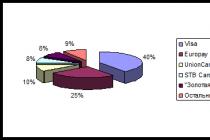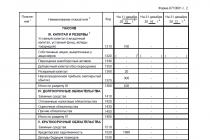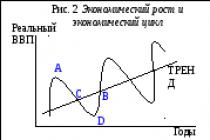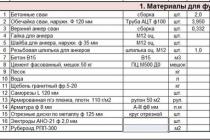Wherein federal standards set as general accounting requirements (which must be applied by all economic entities, regardless of the type of economic activity) and special accounting requirements in certain industries ( part 3 and 4 tbsp. 21 of Law No. 402-FZ). General requirements include, in particular:
- definitions and signs of accounting objects, the procedure for their classification, the conditions for their acceptance for accounting and write-off in accounting;
- permissible methods of monetary measurement of accounting objects;
- the procedure for recalculating the cost of accounting objects, expressed in foreign currency, in the currency of the Russian Federation;
- requirements to accounting policy(including determining the conditions for its change), inventory of assets and liabilities, documents and workflow;
- chart of accounts and the procedure for its application;
- the composition, content and procedure for the formation of information disclosed in the accounting (financial) statements, including samples of the forms of these statements, as well as the composition of the annexes to the balance sheet and the income statement and the composition of the annexes to the balance sheet and the income statement intended use funds;
- conditions under which the accounting (financial) statements give a reliable idea of the financial position economic entity as of the reporting date, the financial result of its activities and the movement Money per reporting period;
- simplified ways of doing accounting, including simplified accounting (financial) statements, for economic entities entitled to apply such methods in accordance with this law.
At the time of entry into force Law No. 402-FZ(recall, it has been applied since January 1, 2013) not a single federal standard has been approved. Moreover, these standards have not been approved over the past years (since 2013). The Ministry of Finance has only plans for their approval, and the deadline for their introduction is often postponed.
Another postponement of the introduction of new federal standards was carried out recently Order of the Ministry of Finance of Russia dated June 7, 2017 No. 85n. It provides an estimated timetable for the implementation of federal standards (see table).
| № | Working title of the draft standard | Estimated effective date of the standard for mandatory application |
| 1 | "Stocks" | 2019 |
| 2 | « Intangible assets» | 2019 |
| 3 | "Rent" | 2020 |
| 4 | "Fixed assets" | 2020 |
| 5 | "Unfinished Capital Investments" | 2020 |
| 6 | "Accounts receivable and accounts payable(including debt costs)" | 2020 |
| 7 | "Documents and workflow in accounting" | 2020 |
| 8 | "Financial statements" | 2020 |
| 9 | "Non-commercial activity" | 2020 |
| 10 | "Income" | 2020 |
| 11 | "Expenses" | 2020 |
| 12 | « Financial instruments» | 2021 |
| 13 | "Mining" | 2021 |
| 14 | “Participation in affiliated organizations and Team work» | 2021 |
As you can see, the financiers plan to put the first federal standard into effect only in 2019. This means that when conducting accounting, economic entities, as before, should be guided by the rules approved by the PBU, which entered into force before January 1, 2013.
Furthermore, federal law dated July 18, 2017 No. 160-FZ(Further - Law No. 160-FZ) these standards are recognized as federal. Corresponding amendments have been made to Art. 30 of Law No. 402-FZ, in which from July 19, 2017 a new part 1.1 where it is mentioned. This part also contains an important caveat that the rule on the priority of federal standards over industry ones does not apply to such standards.
We add: the indicated amendments have been made to Law No. 402-FZ very timely, since immediately after the signing by the President of the Russian Federation Law No. 160-FZ was registered by the Ministry of Justice Order of the Ministry of Finance of Russia dated April 28, 2017 No. 69n, which made a number of significant amendments to (which economic entities will need to take into account when drawing up an accounting policy for accounting purposes for 2018). In particular, the named standard is supplemented with new provisions that define the basic principles for the formation of the main accounting document any economic entity.Their essence is this:
1. Organizations are granted the right to choose the methods of accounting independently from other legal entities. An exception is made for subsidiaries: They must use the same methods as the parent company.
2. If a company prepares financial statements in accordance with IFRS, then when forming an accounting policy, it has the right to be guided by federal accounting standards, based on the requirements of IFRS. However, if the method of accounting recommended by federal standards is contrary to IFRS, then the organization may not apply this method. The company will then have to justify why the method proposed by the federal standard is contrary to IFRS.
3. Subjects that have the right to apply simplified accounting methods, in the absence of proposals for keeping records on a specific issue in federal standards, can form an accounting policy based only on the principle of rationality.
4. In exceptional situations, if the application PBU 1/2008 would result in unreliable information about the financial position of the entity, it is allowed to deviate from the rules, provided that the circumstances that prevent the use of this PBU are determined and alternative accounting methods are introduced that will not lead to even greater unreliability of accounting. An entity is required to disclose selected alternative accounting treatments (in the accounting policies and notes to financial statements).
The Ministry of Finance has prepared a draft order on the approval of the federal accounting standard for organizations public sector"Accounting policy, estimated values and errors” (hereinafter referred to as the Standard). Although this document is in the draft stage, it is planned that it will be applied from January 1, 2018.
The Standard establishes requirements for the formation, approval and change of accounting policies, as well as the rules for reflecting in the financial statements the consequences of changes in accounting policies, estimated values and corrections of errors.
Formation and approval of accounting policy
Currently General requirements to the formation of accounting policies of institutions are defined in the Law on Accounting and Instruction No. 157n. The Standard also contains similar provisions, while they are supplemented by new rules.
In particular, as now, state (municipal) institutions will draw up accounting policies on their own, based on their structure, sectoral and other characteristics of their activities, guided by the legislation of the Russian Federation, federal and industry standards, and other regulatory legal acts regulatory bodies. At the same time, according to the Standard, institutions can also be guided by accounting policy body exercising the powers and functions of the founder.
The Standard specifies what is formed by the chief accountant of the institution or other individual (legal) person entrusted with accounting, and approved by the head of the institution.
If accounting in an institution is carried out by a centralized accounting department, the founder has the right to determine the accounting policy applied in the institution.
Note: according to the Standard, the main provisions of the accounting policy are subject to public disclosure on the official website of the institution.
The accounting policy of the institution should contain:
the procedure for recognition (registration) and termination of recognition (deregistration) of accounting items, as well as methods for their evaluation and the procedure for disclosing information about them in financial statements;
worker, containing the accounts necessary for maintaining synthetic and analytical accounting;
the procedure for conducting an inventory of assets and liabilities;
forms of primary (consolidated) accounting documents used for registration of facts economic life, registers and other accounting documents. Forms of documents approved by the subject of accounting must contain required details, provided by law RF;
document flow rules, including the procedure and terms for the transfer of primary accounting documents in accordance with the approved workflow schedule;
accounting information processing technology;
the procedure for organizing and ensuring (implementing) internal financial control;
other solutions necessary for the organization and maintenance of accounting and preparation of financial statements.
Change in accounting policy
The Standard specifies cases when changes are made to an accounting policy. These include cases:
1) changes in the legislation of the Russian Federation on accounting, federal and industry standards and regulatory legal acts of the bodies regulating accounting;
2) development or selection of a method of accounting, the use of which will provide reliable and more relevant information in the financial statements;
3) significant changes in the conditions of the institution's activities, including its reorganization, changes in the powers assigned to it and the functions performed.
As a rule, a change in accounting policy is made from the beginning of the reporting year, unless otherwise stipulated by the reason for such a change. If changes are made during the reporting year, it is necessary to agree with the founder and with financial authority relevant public law education.
Note: not considered a change in accounting policy:
application of the method of organizing and maintaining accounting records to reflect the facts of economic life, which are different in essence from transactions that took place earlier;
approval of a new way of organizing and maintaining accounting to reflect the facts of economic life that arose in the activities of the institution for the first time.
Consequences of changes in accounting policies
The Standard describes in sufficient detail the procedure for reflecting in accounting and financial statements the consequences of a change in accounting policy (hereinafter referred to as the consequences of a change in CP). These provisions are an innovation for state (municipal) institutions, since such norms are not established in the current regulatory legal acts.
According to the Standard, the consequences of changes in the TC that have had or may have a significant impact on financial position, financial performance and (or) cash flow of the institution, are evaluated in monetary terms. This estimate is made as of the date from which the changes are applied.
The procedure for reflecting the consequences of changing the CP will depend on the case that resulted in the need to make such changes. For clarity, we present given order in the form of a diagram:
For reference.
Retrospective application of a changed accounting policy is the application of changes to the facts of business as if the changed accounting policy had been applied since the occurrence of the relevant fact. Retrospective application of the changed accounting policy is carried out by adjusting comparative figures for the previous year(s).
If a retrospective application of the changed accounting policy is applied, the opening balances under the item “ Financial results economic entity" balance sheet, as well as indicators of related items of financial statements for the earliest previous year for which comparative figures are disclosed in the financial statements, or at the beginning of the reporting year, if otherwise is practically impossible. Adjusted comparative indicators of the previous year (s) are given in the financial statements of the reporting year under the heading “Recalculated”.
At the same time, the financial statements for the previous year (s) are not subject to revision, replacement and resubmission.
The amounts of adjustments to comparatives are reflected in the accounting entries in the period in which the change in accounting policy took place.
Note: retrospective application of a changed accounting policy is not practicable if a monetary estimate of the effect of the change:
1) cannot be produced due to insufficient (absence) of information for the corresponding previous year;
2) requires the use of estimates based on information that was not available at the date of submission of financial statements for the previous year.
In these cases, the institution applies the changed accounting policy to the facts of economic life that arise after the date of the change in accounting policy ( promising application changed accounting policy).
Disclosure in reporting
Information about the accounting policy of the institution is subject to disclosure in the accounting (financial) statements. The composition and content of such information are established by the relevant federal and industry standards.
With regard to changes in accounting policies, the following information is disclosed in the notes to the accounting (financial) statements:
rationale for changes;
the procedure for reflecting the consequences of a change in the accounting program in the financial statements, including indications of the circumstances in connection with which the chosen procedure is applied, and the date from which the application of the changed accounting policy is carried out.
In case of retrospective application of the changed accounting policy, the following shall be specified:
the amount of adjustments for each item of the financial statements for each of the previous years, in respect of which comparative indicators are disclosed;
amounts of adjustments relating to years prior to those for which comparative figures are disclosed in the financial statements, to the extent practicable.
Change in estimates
An estimated value is a calculated or approximately determined value of an indicator required for accounting and reflected in financial statements. Estimated values include:
terms beneficial use OS and intangible assets;
reserve amounts upcoming expenses;
depreciation allowances;
price not financial assets(in cases stipulated by federal and industry standards);
other similar indicators determined on the basis of the professional judgment of authorized persons.
According to the Standard, a change in an estimated value is an adjustment to the value of an indicator reflected in accounting records or financial statements due to a change in the facts and circumstances on the basis of information about which it was calculated.
Note: a change in an estimate is not a change in accounting policy, nor is it a correction of an error. However, a change in the method of determining (calculating) the estimated value is recognized as a change in accounting policy.
Thus, if a change in any indicator used for accounting or reflected in the statements is not the result of a change in accounting policy, then the said change is recognized as a change in the estimated value.
The order of reflection in accounting estimated values and their changes are established by the relevant federal or industry standards and other regulatory legal acts of the Ministry of Finance.
The order of reflection in the financial statements.
The change in the estimated value is reflected in the financial statements prospectively, namely:
in the period in which the change occurred, if such a change affects the indicators of the accounting (financial) statements of only this reporting period;
in the period in which the change occurred, and in future periods, if such a change affects the financial statements of this reporting period and future periods.
Disclosure of information in reporting.
The explanatory notes to the accounting (financial) statements disclose the following information on changes in the estimated value:
a description of the change in the estimated value that affected the accounting (financial) statements for the reporting period;
a description of the change in the estimated value that will affect the accounting (financial) statements for future periods, unless it is practically impossible to evaluate in monetary terms the impact of the change in the estimated value on the accounting (financial) statements for future periods. The fact and reasons for the impossibility of this assessment are also subject to disclosure.
Reflection of corrections of errors in financial statements
The Standard explains what is recognized as an error in the financial statements, provides the procedure for correcting it depending on the period when the error was discovered, as well as the procedure for disclosing information in the explanatory notes to the financial statements.
Error in accounting an omission and (or) distortion that occurred in the course of accounting and (or) formation of financial statements as a result of incorrect use of information about the facts of the economic life of the reporting period, which was available on the date of signing the statements and should have been received and used in its preparation ( hereinafter referred to as the reporting period error).
For reference: The date of signing of financial statements is the date of signing in in due course a complete set of accounting (financial) statements.
The deadline for the submission of financial statements is the last business day due date sending it to the body authorized to accept financial statements and (or) generate consolidated financial statements (hereinafter referred to as the authorized body).
The date of acceptance of financial statements by the authorized body is the date of putting a mark (sending a notification) on the acceptance of statements based on the results of a desk audit.
The date of approval of financial statements is the date of approval of the report on the execution of the budget of the relevant public legal entity or the date of approval of financial statements in accordance with budget legislation.
Error correction procedure.
Correction of the identified error is carried out in accounting additional accounting entry or an accounting entry drawn up by the “red reversal” method and an additional accounting entry. We give in the table the procedure for correcting errors, depending on the period of their detection.
|
Error detection period |
Correction procedure |
|
Reporting period error identified in the course of internal control after the date of signing the financial statements, but before the deadline for their submission |
1. Entries are reflected in the accounting accounts as of the date determined by the decision of the body (official) responsible for the implementation of internal control. 2. Corrections are made to the financial statements, the corrected statements are signed in the prescribed manner |
|
Reporting period error revealed during a desk audit of financial statements after the deadline for their submission, but before the date of their acceptance by the authorized body |
- by making entries in the accounting accounts at the end of the reporting period; The corrected financial statements are re-sent to the authorized body, as well as to other users to whom the original statements were submitted. The notes to the amended financial statements provide information that this reporting supersedes the one originally submitted, the reasons for the corrections and their content |
|
Reporting period error identified in the course of internal financial control, external financial control, and internal control or internal financial audit after the date of acceptance of financial statements, but before the date of its approval |
|
|
Reporting period error detected after the date of approval of the quarterly financial statements |
Corrected by decision of the authorized body based on the significance of the identified error: - by reflecting the entries in the accounting accounts in the period in which the error was discovered; |
|
Reporting period error detected after the date of approval of the annual financial statements (hereinafter referred to as the error of the previous year) |
Corrected by decision of the authorized body based on the significance of the identified error: - by making entries on the accounting accounts in the period in which the error is detected; |
In case of a retrospective restatement of financial statements, the approved statements for the previous year (s) are not subject to revision, replacement and re-submission to users of accounting (financial) statements.
If an error was made earlier than the previous year for which comparative figures are disclosed in the financial statements, the incoming balances under the item “Financial result of an economic entity” of the balance sheet, as well as the values of related reporting items for the earliest previous year for which comparative figures are disclosed, are subject to adjustment.
In the case when it is practically impossible to unambiguously attribute the amounts of adjustments to a specific previous year, the incoming balances under the item “Financial result of an economic entity” of the balance sheet, as well as the values of related items of the accounting (financial) statements for the earliest previous year to which they can be adjusted are subject to adjustment. attributed, or at the beginning of the reporting year.
The procedure for disclosing information in reporting in relation to errors of previous years.
The following information is disclosed in the explanatory notes to the financial statements for the reporting year:
error description;
the amount of adjustment for each item of the accounting (financial) statements for each of the previous years, for which comparative indicators are disclosed in the accounting (financial) statements, to the extent that it is practically possible;
the total amount of the adjustment at the beginning of the earliest of the previous years, for which comparative indicators are disclosed in the accounting (financial) statements;
a description of the reasons why it is not practicable to adjust the comparative figures of the accounting (financial) statements for one or several previous years, as well as a description of the method for recording the correction of an error, indicating the period in which the corrections are reflected.
Let's summarize all of the above. The Standard contains general requirements for the formation, approval and change of accounting policies. The procedure for reflecting the consequences of changes in accounting policies in accounting and financial statements is described in detail. Also, this document establishes the rules for reflecting changes in estimated values and corrections of errors in financial statements.
With the entry into force of this standard, the main provisions of the accounting policy are subject to public disclosure on the official website of the institution.
It is planned that the Standard will be applied in the preparation of financial statements for periods beginning on January 1, 2018. Earlier application is allowed upon agreement with the Ministry of Finance.
Since the entry into force of the Federal Law of December 6, 2011 N 402-FZ "On Accounting", which proclaimed the freedom of forms primary documents, the Federal Tax Service took over the function of developing electronic document formats.
Those organizations that have decided to switch to electronic interaction with counterparties need to revise their accounting policies in terms of making such changes.
From July 1, 2017, the "old" electronic formats TORG-12 and the act of acceptance and delivery of works (services), approved back in 2012, became invalid (Order of the Federal Tax Service of Russia dated May 20, 2016 N ММВ-7-15 / [email protected]). Now only the "new" electronic formats of the consignment note and the act of acceptance and transfer of works and services are used, approved. by orders of the Federal Tax Service of Russia dated November 30, 2015 N MMV-7-10 / [email protected] and dated 30.11.2015 N ММВ-7-10/ [email protected]
Starting from July 1, 2017, the “new” formats of invoices (including corrective ones), UPD, UKD became mandatory (orders of the Federal Tax Service of Russia dated 03.24.2016 No. ММВ-7-15 / [email protected], dated April 13, 2016 No. ММВ-7-15/ [email protected]). Until June 30, 2017 inclusive, these formats were used at the choice of the organization along with the "old" ones, approved. by order of the Federal Tax Service of Russia dated 04.03.2015 No. ММВ-7-6/ [email protected]
Therefore, information in the accounting policy on the use of invalid formats must be adjusted.
- The UE must contain an indication of the use of EDI;
- The PM should establish which documents are used to recognize the fact of economic life, as well as the procedure for determining the date of creation of documents for the purposes of accounting and tax accounting(for example, if business transaction made on one date, and the signature was received in the next reporting period);
- The formats of primary documents used (including electronic documents) must be included in the PM.
Development and updating accounting policy
Change in accounting methods
The main changes are related to the entry into force of amendments to PBU 1/2008 “Accounting Policy of the Organization” from August 06, 2017 (Order of the Ministry of Finance of the Russian Federation dated April 28, 2017 No. 69n).
On the application of the new provisions of PBU, the Ministry of Finance of Russia issued an Information Message dated August 2, 2017 N IS-accounting-9.
What to look for when changing accounting policies for 2018:
The ratio of the accounting policies of different organizations is determined
A rule has been introduced on the independent choice of the method of accounting, regardless of the choice of other organizations. But if the main company has approved its standards that are mandatory for use by subsidiaries, then the subsidiaries choose the methods of maintenance from the standards approved by the parent company (clause 5.1 PBU 1/2008). Since it is possible to ensure the comparability of consolidated data only if they are evaluated and reflected according to the same rules. In the previous edition of PBU 1/2008, the procedure for the formation of accounting policies by subsidiaries was not specified.
The algorithm for forming the accounting policy of the organization has been refined
The new edition of PBU 1/2008 provides for procedures for the formation of an organization's accounting policy for the following cases:
- The Federal Accounting Standard (FSBU) establishes one method of accounting for a specific issue - this method is chosen.
- The FSB establishes several acceptable accounting methods for a specific issue - one of the possible ones is selected.
- The FSBU does not contain acceptable accounting methods for a specific issue - the organization develops it itself, based on paragraphs. 5 and 6 PBU 1/2008 and accounting recommendations, consistently referring to IFRS, federal (PBU) and industry accounting standards (clause 7.1 PBU 1/2008).
Thus, the main document in this case is IFRS. And only in the absence of the necessary methods in IFRS, the organization has the right to focus on the FSB and industry accounting standards for similar and (or) related issues. Then, in descending order, there are recommendations of non-state accounting regulation bodies.
However, in order to comply with the new requirement PBU 1/2008, it is necessary to be sufficiently fluent in international standards. For example, there is currently no federal standard for renting and leasing. But there is such a standard in IFRS. Therefore, in choosing how to account for lease transactions, an entity should be guided by the rules set out in IAS 17 Leases.
The previous version of PBU 1/2008 did not establish a priority for IFRS in non-standard transactions.
Firms conducting simplified accounting (small enterprises, non-profit organizations, Skolkovo participants), as well as in relation to insignificant information, when forming an accounting policy, it is sufficient to be guided by the requirement of rationality (clause 7.2 of PBU 1/2008).
At the same time, information is recognized as insignificant, the presence, absence or method of reflection of which in the accounting (financial) statements of the organization does not depend economic decisions users of this report. The classification of information as insignificant is carried out by the organization independently, based on both the magnitude and nature of this information.
The entities listed in paragraph 4 of Article 6 of the Federal Law of December 6, 2011 N 402-FZ “On Accounting” have the right to simplify accounting, including small businesses (SMEs). Which organizations belong to SMEs is indicated in Article 4 of the Federal Law of July 24, 2007 N 209-FZ "On the development of small and medium-sized businesses in the Russian Federation."
Simplified accounting and reporting methods do not apply SMPs subject to mandatory audit(clause 1, clause 5, article 6 of Law N 402-FZ). Thus, if your organization belongs to the SMP by virtue of Law N 209-FZ, but is subject to mandatory audit by virtue of Law N 307-FZ, then it does not have the right to conduct simplified accounting.
Note that the definition of the requirement of rationality in RAS 1/2008 is given in a new edition. Now the accounting policy should provide, among other things, rational accounting based on business conditions and the size of the organization, as well as based on the ratio of the costs of generating information about a specific accounting object and the usefulness (value) of this information (previously - rational accounting based on the conditions management and the size of the organization).
That is, the costs of accounting for the specified object should not be unreasonably high compared to the effect of using this object.
DEVELOPMENT AND UPDATING ACCOUNTING POLICY
The accounting policy (AP), drawn up in the constructor, is not able to take into account all the individual details of running a particular business. A competent UE helps to justify one's position during tax audits and save on taxes. Annual updating of the PM is needed to take into account: changes in legislation and new facts of the economic life of the organization.
Since July 19, 2017, 24 PBUs operating in the Russian Federation, approved in the period from 10/01/1998 to 01/01/2013, are recognized as federal standards. Them complete list is given in the Information Message of the Ministry of Finance of Russia dated July 26, 2017 N IS-accounting-8.
The right of the organization to unify the accounting policy according to IFRS and according to Russian rules was introduced
The right of an organization to form an accounting policy, taking into account the requirements of IFRS, has been introduced. This right is granted to organizations that disclose:
- consolidated financial statements, which, according to the Federal Law "On Consolidated Financial Statements", is compiled in accordance with IFRS;
- financial statements prepared in accordance with IFRS of an organization that does not create a group (part 5 of Article 2 of the Federal Law "On Consolidated Financial Statements").
When forming an accounting policy for 2018, these organizations may be guided by the FSB, taking into account the requirements of IFRS. Therefore, if the use of some method of accounting according to the FSB leads to a discrepancy between the accounting policy of the organization with the requirements of IFRS (i.e., prevents compliance with these requirements), then the organization has the right not to apply this way bookkeeping.
Instead of this method, the method provided for by IFRS is applied. Your right must be fixed in the accounting policy.
The procedure for deviating from the general algorithm for the formation of accounting policies has been regulated
PBU 1/2008 was supplemented with special rules governing the actions of an organization when choosing (developing) accounting methods in cases where following the general procedure leads to an unreliable presentation of the financial position of such an organization, the financial results of its activities and the movement of its cash in the accounting (financial) statements . Of course we are talking about exceptional cases.
The organization has the right to derogate from general order formation of an accounting policy subject to all of the following conditions:
- The circumstances preventing the formation of a reliable idea of the financial position of the organization, financial performance and cash flow in the accounting (financial) statements are determined.
- An alternative method of accounting is possible, the use of which allows eliminating these circumstances.
- The alternative method of accounting does not lead to other circumstances in which the accounting (financial) statements of the organization will give an unreliable idea of its financial position, financial performance and cash flows.
In this regard, RAS 1/2008 was also supplemented with requirements for the disclosure in the financial statements of information on deviations from general rules and application alternative way bookkeeping.
Let's summarize
By itself, the innovation PBU 1/2008 does not have any significant impact on the activities of most organizations. After all, as before, the work should be guided by the rules approved by the PBU accountants familiar to all accountants (now renamed the FSB). But companies that prepare statements in accordance with IFRS, consolidated financial statements, maintain simplified accounting, have subsidiaries, or when conducting non-standard transactions that are not described in current PBUs, should bring their accounting policies in line with new edition PBU 1/2008.
DEVELOPMENT AND UPDATING ACCOUNTING POLICY
The accounting policy (AP), drawn up in the constructor, is not able to take into account all the individual details of running a particular business. A competent UE helps to justify one's position during tax audits and save on taxes. Annual updating of the PM is needed to take into account: changes in legislation and new facts of the economic life of the organization.
Tax accounting policy for 2018
The changes that come into effect from 2018 are minor. It is necessary to take them into account for those taxpayers whose activities are affected by the new provisions of the Tax Code of the Russian Federation. Innovations are as follows.
Accounting for the acquisition of fixed assets
For the period 2018–2022, the list of objects for which the accelerated depreciation with a special coefficient, but not higher than 3 (Federal Law of September 30, 2017 N 286-FZ). But the multiplying factor can be applied to those facilities that will be put into operation after January 1, 2018 and only in relation to facilities included in the relevant list approved by the Decree of the Government of the Russian Federation (clause 4, clause 2, article 259.3 of the Tax Code of the Russian Federation, as amended with 01/01/2018, clause 3, article 5 of the Federal Law of 09/30/2017 N 286-FZ). If a company has such facilities and intends to apply special coefficient when they are depreciated given right should be fixed in the accounting policy.
From January 1, 2018, Chapter 25 of the Tax Code of the Russian Federation introduced the concept "investment tax deduction» (Federal Law No. 335-FZ of November 27, 2017). The procedure for its application is established by the new Art. 286.1 of the Tax Code of the Russian Federation.
From 2018, taxpayers have the right to reduce income tax ( advance payment) for investment tax deduction (expenses for the purchase (modernization) of fixed assets belonging to 3-7 depreciation groups).
But maximum size the deduction for the regional part of the tax cannot exceed the difference between the calculated amount of tax without applying the deduction and the tax calculated at the rate of 5% (unless a different rate is established by the constituent entity of the Russian Federation), i.e. 5% will have to be paid to the budget of the constituent entity of the Russian Federation. If the deduction turns out to be more than the tax, then the unused part is transferred to the following years.
The investment deduction is applied to the tax starting from the period in which the fixed asset object was put into operation, or its initial cost was changed.
At the same time, fixed asset objects in respect of which the taxpayer has applied investment deduction not subject to depreciation.
In the event of the sale of property in respect of which the investment deduction was applied, after the expiration of its useful life, the entire amount due under the contract will be income. If the fixed asset, for which the investment tax deduction was applied, is sold before the expiration of its useful life, the taxpayer will have to recover the amount of tax not paid due to the application of the deduction, as well as pay the appropriate penalties. In this case, the costs will take into account the initial cost of such a fixed asset.
When deciding on the use of an investment tax deduction, it is necessary to take into account that when desk audit declaration, the tax authority has the right to demand explanations and documents regarding the application of the deduction (new paragraph 8.8 of Article 88 of the Tax Code of the Russian Federation).
In addition, transactions of an organization that applies the deduction with its related party will be recognized as controlled if the income from transactions exceeds calendar year the amount of 60 million rubles (subparagraph 9 of paragraph 2 of Article 105.14 of the Tax Code of the Russian Federation).
The new norm establishes that the categories of taxpayers entitled to a tax deduction will be determined by regional legislation. The subjects of the Russian Federation will be able to determine other features of the investment tax deduction.
Considering that such innovations improve the position of taxpayers, the constituent entities of the Russian Federation will be able to adopt relevant laws and apply them for the period from January 1, 2018. However, the decision to use the deduction should be fixed in the accounting policy for tax purposes. Since its application is the right of the taxpayer, and not mandatory norm.
Accounting for R&D expenses
Additions have been made to the rules for accounting for R&D expenses (Federal Law No. 166-FZ of July 18, 2017). In particular, the list of R&D costs will be supplemented with new types of costs. The procedure for recognizing R&D expenses according to the List approved by Decree of the Government of the Russian Federation of December 24, 2008 N 988, which are allowed to be taken into account in taxation with a multiplying coefficient of 1.5, has been clarified (clause 7, article 262 of the Tax Code of the Russian Federation).
Now such costs can be included in other expenses of the reporting (tax) period in which R&D or individual stages of work are completed. However, from 01/01/2018, expenses under the List with a coefficient of 1.5 will also form the initial cost of depreciable intangible assets - exclusive rights to the results of intellectual activity obtained as a result of R&D. In the tax accounting policy, it is necessary to fix the chosen procedure for recognizing expenses.
5% rule for separate accounting of input VAT
From January 1, 2018, amendments will come into force regarding companies that have VATable and non-VATable transactions. Amendments to the Tax Code of the Russian Federation were introduced by Federal Law No. 335-FZ of November 27, 2017.
As you know, when carrying out taxable and non-taxable transactions, the taxpayer is obliged to keep separate records of input VAT. But if the costs of non-taxable transactions in the total amount of expenses do not exceed 5%, the taxpayer has the right not to keep separate records and to deduct the entire amount of VAT.
Implementation of the "5% rule" in tax period will no longer allow taxpayers to keep separate records of input VAT on taxable and exempt transactions. Only the possibility of deducting the entire "general economic" VAT, ie, VAT on goods (works, services) purchased for use simultaneously in both taxable and non-taxable transactions, will remain.
Recall that currently tax authorities and the Ministry of Finance of the Russian Federation give similar explanations for the application of the “5% rule”, based on the definition of the Supreme Court of the Russian Federation of October 12, 2016 N 305-KG16-9537 in case N A40-65178 / 2015. Supreme Court The Russian Federation pointed out that it is impossible to deduct VAT on goods (works, services) purchased exclusively for non-taxable transactions, even if the “5% rule” is observed. From January 1, 2018, the position of the Armed Forces of the Russian Federation will be officially enshrined in clause 4 of Article 170 of the Tax Code of the Russian Federation.
Therefore, the provisions of the accounting policy for tax purposes for 2018 in terms of maintaining separate accounting VAT must be brought in accordance with the new norm of Article 170 of the Tax Code of the Russian Federation.
Finally, we add that general rule a change in accounting policy is made from the beginning of the reporting year, unless otherwise stipulated by the reason for such a change and is formalized by an order, order, standard of the organization, dated December 2017.
At the same time, it makes no sense to rewrite into the accounting policy what is already said in the Tax Code or PBU. You need to enter only those conditions in which you choose one of the accounting methods proposed by the legislator. This is true for change as well. It is necessary to enter them into the accounting policy if the amendments relate to the accounting methods used by your organization.
"Accounting policies, estimated values and errors" is one of the federal accounting standards, the provisions of which will come into force as early as January 1, 2018. So far, the document exists only as a draft, but already now it can be found on the website of the Ministry of Finance of the Russian Federation and understand what changes await institutions in this part of accounting.
Who has the right to develop and approve accounting policies
Today, the law does not limit the circle of persons who can or should, there is only one condition in Instruction No. 157n - the head of the institution must approve it.
The draft federal standard clearly defines the person responsible for the development of the document. it Chief Accountant or an employee who is entrusted with the responsibility of keeping records, since it is he who is responsible for maintaining accounting records and the reliability of financial statements.
Possible types and timing of changes
According to paragraph 8 of the federal standard, you can change the accounting policy only in three cases:
- if the legislation governing accounting changes;
- if an institution chooses a different accounting method that would represent more reliable reporting;
- if the institution is reorganized, changes the conditions of activity or powers, etc.
You can correct the document strictly at the beginning of the reporting year. In the middle of the year, even the slightest changes can only be made after agreement with the founder. Another important condition: if the adjustments will affect the financial position of the institution, including the movement of money in the accounts and / or financial result, they must be expressed in money equivalent as of the date from which the said changes apply.
The new standard allows for two types of changes, prospective and retrospective. The first come into force only from the moment of approval, the second, as the name implies, require changes in accounting indicators for previous periods.
In the latter case, the accountant will have to correct the balance sheet of the institution in terms of incoming balances under the item “Financial result of an economic entity” and several other related indicators for past periods. Corrective indicators should be submitted only with the current reporting marked “Recalculated”, it is impossible to change and resubmit reports for the previous year.
Retrospective changes that affect financial indicators institutions are inadmissible in two cases. Firstly, when changes cannot be estimated in monetary terms, because there is not enough data on last year's indicators. Secondly, if the assessment requires information that was not at the disposal of the accountant at the time of submission of reports for the previous year. In such situations, only forward-looking adjustments can be made.
Please note that the following are not included in the accounting policy:
- changing the method of accounting for those types of economic activities that are not typical for the institution;
- approval of a new method of accounting for the facts of economic activity that happened for the first time.
Working Chart of Accounts
This section has been updated recently. Order of the Ministry of Finance of the Russian Federation dated September 27, 2017 No. 148n excluded some accounts from the chart of accounts, which was immediately adopted by the institutions.
In turn, federal standards will expand Single Plan accounts. In particular, additional groups have been identified in the Fixed Assets standard (Order of the Russian Ministry of Finance No. 257n dated December 31, 2016). The “Lease” standard (Order of the Ministry of Finance of the Russian Federation dated December 31, 2016 No. 258n) makes a separate accounting object property that is used under the rights of operating lease and is included in the category of non-financial assets. This, of course, will entail the expansion of the list of balance accounts.
Most likely, the financial department will continue to streamline the ongoing changes, make additional adjustments to Instruction No. 157n, which will naturally affect the working chart of accounts.
While the institution can supplement its accounting policy, for example, add analytical accounts or, conversely, exclude those positions that are not used in the work.
Estimation of accounting objects
Institutions should pay attention to the evaluation algorithm fair value asset, select and approve in the accounting policy one of the methods offered by the federal standard " Conceptual foundations Accounting and Reporting of Public Sector Organizations”, which began operating in May 2017. The institution may be guided by the method market prices or the amortized replacement cost method.
The same applies to the depreciation method. With the entry into force of the federal standard "Fixed Assets", public accountants will receive additional methods calculating the amount of depreciation. Recall, in addition to the previously existing linear method, the standard proposes a diminishing balance method and a depreciation method in proportion to the volume of production. The institution must fix its choice in the accounting policy.
Valuation of fixed assets
Big changes await accountants in terms of valuation of fixed assets (OS) - they also affect accounting policies. Now the cost of replacing parts of the fixed assets that have arisen during the operation of the facility will be included in its cost at the time these costs occur. An important condition is that the criteria for recognizing an OS object must be met (clause 8).
Another innovation concerns capital investments. The costs of systematic inspections during the operation of the facility or during its repair are included in the cost of the asset. This is possible, as in the previous case, only if the object meets the OS recognition criteria.
These changes should also be reflected in the accounting policy of the institution, and the OS groups in respect of which the institution will apply the provisions of the federal standard should also be listed there.
Inventory order
When conducting an inventory of their property and assets, many institutions today rely on the Methodological Guidelines approved by the Order of the Ministry of Finance of the Russian Federation of June 13, 1995 No. 49, and in the accounting policy they only refer to the document. The requirement to fix the inventory order in the accounting policy is accepted only for state institutions in Instruction No. 157n.
However, a draft order has been published on the website of the financial department, which terminates Guidelines. This means that the algorithm and timing of the inventory of property and financial assets of the public sector organization will have to be developed independently and prescribed in the accounting policy. You can do this in advance.
The Federal Standard "Fixed Assets" has made one more clarification regarding inventory accounting. It prescribes to fix in the accounting policy the procedure for assigning an individual number to an object. The reference point for institutions should be the federal standard itself and Instruction No. 157n.
Accounting for events after the reporting date
Now, in order to take into account such events, institutions use only the provisions of the PBU 7/98 of the same name “Events after the reporting date” (Order of the Ministry of Finance of the Russian Federation of November 25, 1998 No. 56n), there are no instructions in Instruction No. 157n on this account. On January 1, 2018, the federal standard of the same name will come into force, which will close this gap. It created a classification of events, spelled out clear rules for their reflection in accounting and disclosure of information in the formation of regulated reporting. The provision of the standard should be applied with respect to the reporting period, which will begin on January 1, 2018, but they should be included in the accounting policy of the institution in the near future.
Disclosure of information about accounting policies in reporting
The basic provisions of the accounting policy should be posted on the official website of the organization. In addition, information about accounting policies must also be reflected in the reports that the institution submits to regulatory authorities. At the same time, it should be remembered that all changes that will come into force on January 1, 2018 relate to the new reporting period, which starts on January 1 of the next year.
AT explanatory note to the reporting, the accountant must indicate the essence of the changes and the date from which the updates come into effect, justify their necessity and state how exactly these innovations will affect the financial statements.
If a retrospective method of changing accounting policies is chosen, the explanatory note specifies all possible amounts of adjustments for accounting items for previous periods.
Theoretically, changes in the accounting policy should be developed and approved already now in order to bring the document in line with federal standards by the new year. But since the Accounting Policies, Estimates and Errors standard itself is still in the draft status, we recommend waiting for its approval.
6 673 views
From 01/01/2018, new accounting standards come into force. We make changes to the accounting policy of the enterprise public sector according to the list of orders of the Ministry of Finance dated December 31, 2016:
- No. 256n "Conceptual Framework for Accounting and Reporting of Public Sector Organizations".
- No. 257n "Fixed assets".
- No. 258n "Rent".
- No. 259н "Depreciation of assets".
- No. 260n "Presentation of financial statements".
Important changes have affected the accounting of fixed assets in the institution. Now, to simplify the accounting of fixed assets, you can combine fixed asset units into groups. For example, in order not to take into account a wardrobe, a table and an office chair separately on the balance sheet, you can capitalize the OS group as an “Office furniture set” with detailed description in inventory card. To use this method, write in detail in the accounting policy of the organization when and how you will combine fixed assets.
In terms of depreciation methods in 2019, the accounting policy of the organization is formed in a new way. Three methods are available to choose from: linear, proportional to the volume of production and the reducing balance method. At the end of 2019, you need to take an inventory and determine which depreciation method is right for your company.
For NPOs: RAS, accounting policy of the organization in 2019
Changes to PBU 1/2008 "Accounting policy of the organization" were approved by order of the Ministry of Finance No. 69n dated April 28, 2017. The innovations came into force on 08/06/2017. Check if the changes are reflected in your UE:
- An economic entity independently determines the method of accounting, regardless of other persons. Exception: branches and subsidiaries.
- If the accounting provision "Accounting policy of the organization" leads to a distortion accounting information, then a deviation from the established norms is permissible, but this will have to be justified in the UE.
- If the approved innovations can be applied from a new reporting period or a voluntary transition can be made earlier, then in case of a voluntary transition, this condition must be reflected in the accounting statements.
- When preparing financial statements in accordance with IFRS, an organization must apply federal standards. If the accounting method established by the FS contradicts IFRS, then the organization has the right not to use this method, but this should be justified in the AP.
For state employees: instruction No. 157n has been changed
AT next year using the "old" working chart of accounts of the institution will not work. The updated order No. 157n corrected the names of some existing accounts, and was also supplemented with new accounting accounts. So, for example, in 2019, be sure to add account 206 61 “Calculations on advances on pensions and payments for pension, social and medical insurance” to the working chart of accounts.
Approved new order accounting for past errors. Write down a new order in the accounting policy, set a subconto for the accounts for which errors were identified.
New in tax legislation
Changes tax code(Chapter 25) in 2019 do not require cardinal decisions when choosing accounting methods. Additions and clarifications have adjusted the following rules:
- The list of incomes that are not taken into account when determining tax base, added:
- Receipts identified after the inventory property rights according to the results of intellectual activity.
- Funds received as a contribution to fixed assets legal entity(clauses 3.6 and 3.7 of clause 1 of article 251 of the Tax Code of the Russian Federation).
- Income of NGOs providing financial support overhaul apartment buildings, are excluded from the temporary placement of free monetary assets (clause 38, clause 1, article 251 of the Tax Code of the Russian Federation).
In case of changes in the TP in terms of calculating the tax base for profit, property tax should be excluded from the base. Now apply this benefit in a relationship movable property(accepted on the balance sheet after 2012 (clause 25, article 381 of the Tax Code of the Russian Federation)) is possible only if there is an appropriate decision in the region (article 381.1 of the Tax Code of the Russian Federation).














